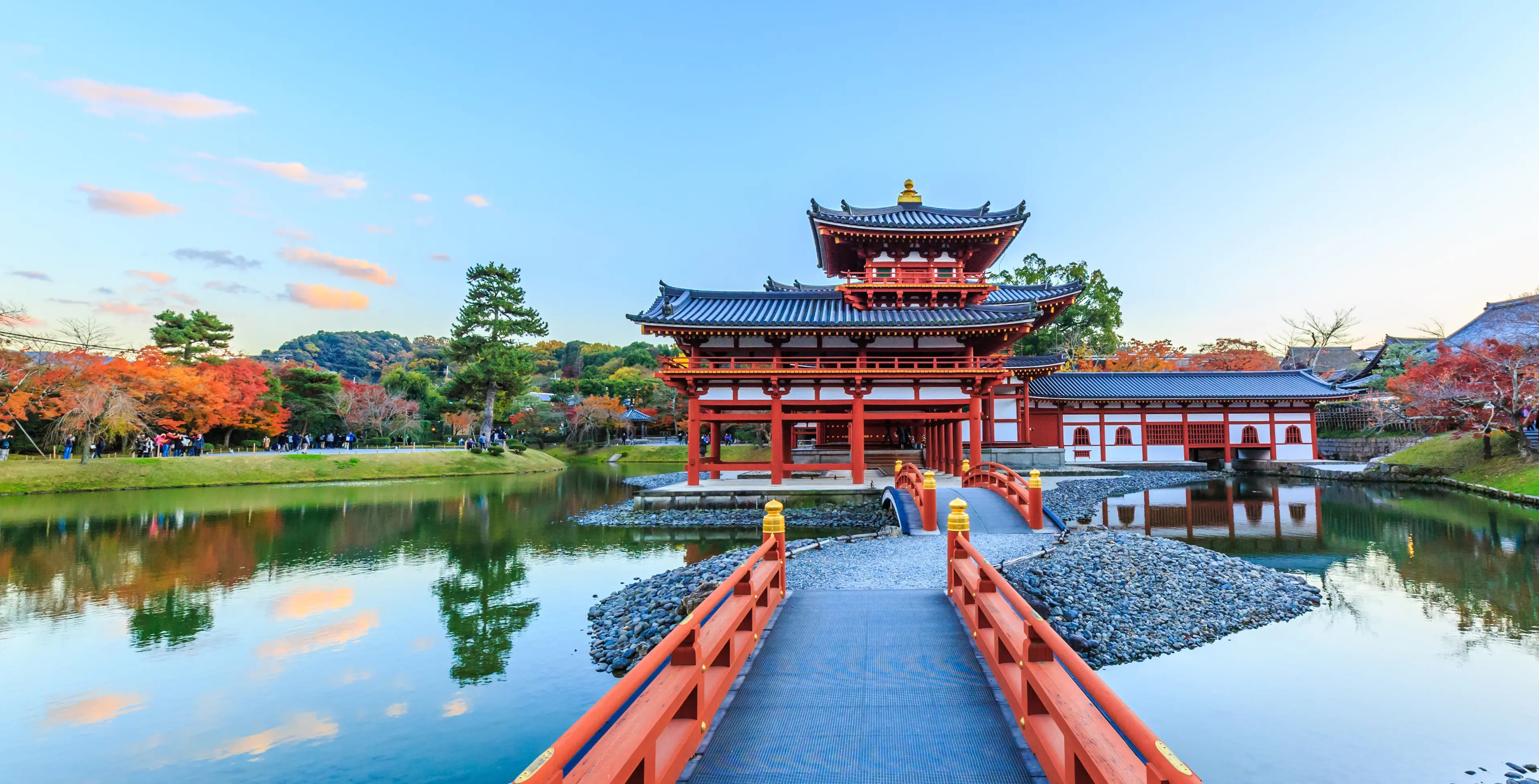
Uji, a city located in the Kyoto prefecture of Japan, is a hidden gem that offers a unique blend of history, culture, and natural beauty. Renowned for its beautiful tea fields and the production of high-quality matcha, Uji has become a popular destination for tea enthusiasts from around the world. But there’s much more to this charming city than just tea. With its rich historical background dating back over a thousand years, Uji is home to several impressive landmarks, including the iconic Byodoin Temple, a UNESCO World Heritage site. From picturesque landscapes to traditional tea ceremonies, Uji has something to offer for every type of traveler. In this article, we will delve into 42 fascinating facts about Uji, shining a light on the hidden treasures and unique experiences that await visitors in this enchanting Japanese city.
Key Takeaways:
- Uji, a historic city in Japan, is famous for its rich tea culture, stunning natural landscapes, and traditional arts. Visitors can immerse themselves in ancient temples, tea ceremonies, and the flavors of Uji tea.
- With its UNESCO World Heritage sites, vibrant festivals, and serene atmosphere, Uji offers a perfect blend of history, nature, and cultural experiences. From tea tastings to cherry blossom viewing, there’s something for everyone to enjoy in this charming city.
Uji is a historic city located in the Kyoto Prefecture of Japan.
Uji is renowned for its rich cultural heritage and picturesque surroundings, making it a popular destination for tourists.
Uji is famous for its high-quality green tea production.
The city is known for producing some of the finest matcha and green tea in Japan, which is highly sought-after both domestically and internationally.
Uji is home to the iconic Byodo-in Temple.
Byodo-in Temple, a UNESCO World Heritage Site, is known for its stunning architecture and serene surroundings. It is also featured on the back of the Japanese 10 yen coin.
The Tale of Genji, one of the world’s first novels, is set in Uji.
Written by Murasaki Shikibu in the 11th century, this literary masterpiece takes place in the city of Uji and provides a glimpse into the Heian period of Japan.
Uji has a long and rich history dating back over a thousand years.
The city was an important cultural and political center during the Heian Period and played a significant role in the development of Japanese culture.
Uji is surrounded by scenic natural landscapes.
The city is nestled between the Uji River and the Mount Atago Range, offering breathtaking views and a tranquil atmosphere for visitors to enjoy.
Uji is known for its traditional tea houses.
Visitors can experience the art of tea ceremony and enjoy freshly brewed matcha while immersing themselves in the traditional Japanese aesthetics.
Ujigami Shrine is the oldest Shinto shrine in Japan.
Dating back to the 8th century, Ujigami Shrine holds significant historical and religious importance and is designated as a UNESCO World Heritage Site.
The Uji River flows through the heart of the city, adding to its scenic beauty.
Known for its clear waters and picturesque surroundings, the Uji River is a popular spot for boat rides and leisurely walks along its banks.
Uji is home to several traditional Japanese gardens.
These meticulously designed gardens feature serene ponds, vibrant flora, and carefully crafted landscapes, providing visitors with a peaceful retreat.
Uji is famous for its production of Uji tea utensils.
Skilled craftsmen in Uji create traditional tea utensils such as tea bowls, tea scoops, and tea whisks, which are highly valued by tea enthusiasts around the world.
Uji is the birthplace of the Uji-style tea ceremony.
The Uji-style tea ceremony emphasizes the appreciation of matcha and is known for its focus on simplicity, tranquility, and respect.
Ujigami Shrine is a popular spot for cherry blossom viewing (hanami) in the spring.
During cherry blossom season, the grounds of Ujigami Shrine become adorned with beautiful sakura trees, creating a magical atmosphere.
Uji is known for its traditional wooden bridges.
The city boasts several picturesque wooden bridges, such as the Uji Bridge and the Byodo-in Temple Bridge, which add to the charm of the cityscape.
Uji is home to several ancient Buddhist temples.
These temples, such as Hogon-ji and Mimuroto-ji, offer visitors the opportunity to explore Japan’s religious and cultural heritage.
Uji is famous for its production of traditional Japanese sweets.
Sweet treats like yatsuhashi and matcha-flavored confections are made using locally sourced ingredients and reflect the flavors of the region.
Uji is often referred to as the “Tea Capital of Japan.”
The city’s deep-rooted tea culture and renowned tea production have earned it this prestigious title.
Uji is a popular destination for cycling enthusiasts.
The city offers scenic cycling routes, including the Uji River Cycling Road, which allows visitors to explore the surrounding countryside at their own pace.
Uji is home to the Uji City Botanical Garden.
This expansive botanical garden showcases a diverse range of plant species, providing a tranquil space for nature lovers to appreciate the beauty of flora.
Uji is renowned for its traditional handicrafts.
Artisans in Uji specialize in creating exquisite pottery, textiles, and lacquerware that showcase the city’s rich artistic heritage.
Uji’s proximity to Kyoto makes it an ideal day trip destination.
Located only a short distance from Kyoto, Uji offers visitors the opportunity to experience a more tranquil and traditional side of Japan.
Uji’s serene atmosphere attracts visitors seeking a peaceful retreat.
The city’s abundant greenery, historic sites, and traditional tea houses provide a haven for those in search of tranquility.
Uji offers breathtaking views during the autumn season.
The city’s parks and gardens transform into a colorful display of vibrant foliage, making it a popular spot for experiencing the beauty of autumn in Japan.
Uji is home to the Uji City Museum.
This museum provides insights into the history and culture of Uji, featuring artifacts and exhibits that showcase the city’s rich heritage.
Uji is proud of its local festivals.
Festivals such as the Ujigami Shrine Festival and the Uji Tea Festival celebrate the city’s traditions and offer visitors a chance to immerse themselves in the local culture.
Uji is famous for its Uji River Fireworks Festival.
This annual event attracts thousands of spectators who gather along the Uji River to witness a dazzling display of fireworks lighting up the night sky.
Uji is home to the iconic Uji Bridge.
This historical bridge, spanning across the Uji River, is a symbol of the city and offers a picturesque backdrop for photography enthusiasts.
Uji is known for its traditional machiya houses.
These traditional wooden townhouses can be found throughout the city and showcase Uji’s architectural heritage.
Uji is a paradise for tea lovers.
Visitors can participate in tea tastings, visit tea farms, and explore tea-related shops to fully immerse themselves in the world of Uji tea.
Uji is surrounded by lush tea fields.
The endless green tea plantations create a scenic countryside landscape that adds to the charm and beauty of the city.
Uji is home to the Uji Gyokuro Tea Research Institute.
This institute conducts research and promotes the cultivation of gyokuro tea, a premium type of Japanese green tea highly regarded for its quality.
Uji is a place of pilgrimage for tea enthusiasts.
Tea connoisseurs from around the world visit Uji to experience the authentic flavors and traditions associated with Uji tea.
Uji is known for its Uji-cha tea houses.
These traditional tea houses serve freshly brewed Uji tea, allowing visitors to savor the rich and flavorful taste of this local specialty.
Uji is famous for its scenic hiking trails.
The Mount Atago Range offers various hiking routes, allowing outdoor enthusiasts to explore the natural beauty surrounding Uji.
Uji is home to the Uji Public Library.
This modern library offers a vast collection of books and resources, making it a valuable hub of knowledge for the residents of Uji.
Uji is known for its vibrant summer festivals.
During the summer months, the city comes alive with lively parades, traditional music performances, and colorful decorations.
Uji is a haven for photographers.
The city’s picturesque landscapes, historical sites, and traditional architecture provide endless opportunities for capturing stunning photographs.
Uji is home to the Uji City Tea Museum.
This museum offers a comprehensive overview of Uji’s tea history, featuring exhibits on tea cultivation, production, and the cultural significance of tea in Japan.
Uji is known for its refreshing green tea-flavored ice cream.
Visitors can indulge in this delicious treat, which perfectly combines the flavors of Uji tea with the creamy texture of ice cream.
Uji is a place where old meets new.
The city seamlessly blends its rich heritage and traditions with modern amenities, creating a unique and captivating atmosphere.
Uji is a hub for traditional Japanese arts and crafts.
The city prides itself on preserving and promoting traditional art forms such as pottery, calligraphy, and kimono weaving.
Uji offers a variety of cultural experiences for visitors.
From tea ceremonies and traditional music performances to hands-on workshops, Uji provides opportunities to actively engage with Japanese culture and traditions.
With its rich history, stunning natural beauty, and renowned tea culture, Uji is a must-visit destination for those seeking an authentic Japanese experience. Take a step back in time as you explore ancient temples, appreciate the art of tea ceremony, and indulge in the flavors of Uji tea. Whether you’re a history enthusiast, a nature lover, or a tea connoisseur, Uji has something to offer for everyone. Visit Uji and immerse yourself in the charm and beauty of this historic city.
Conclusion
In conclusion, Uji is a fascinating city with a rich history and a plethora of attractions to explore. From its famous tea culture to its stunning temples and shrines, Uji offers a unique blend of traditional and modern experiences. Whether you are a history enthusiast, a nature lover, or a foodie, Uji has something to offer everyone.Visiting Uji allows you to delve into the world of matcha tea, where you can learn about its origins and participate in traditional tea ceremonies. The city’s beautiful Byodo-in Temple and Ujigami Shrine showcase the impressive architectural prowess of ancient Japan. Uji also boasts picturesque natural landscapes, such as the Uji River and the scenic paths of the Uji City Botanical Gardens.Furthermore, Uji’s proximity to Kyoto makes it an ideal day trip destination. With its convenient transportation links and abundance of cultural treasures, Uji should definitely be on your travel itinerary when visiting Japan.Overall, Uji is a hidden gem that offers a unique glimpse into Japan’s rich cultural heritage. Immerse yourself in the charm and beauty of Uji, and create memories that will last a lifetime.
FAQs
1. What is Uji famous for?
Uji is famous for its high-quality matcha tea, which is renowned not only in Japan but also around the world. It is also known for its beautiful temples and shrines, particularly the Byodo-in Temple.
2. How do I get to Uji from Kyoto?
Uji is easily accessible from Kyoto by train. The JR Nara Line and Keihan Main Line both have stations in Uji, making it a convenient day trip destination.
3. Can I participate in a tea ceremony in Uji?
Yes, you can participate in a traditional tea ceremony in Uji. Many tea houses offer tea ceremony experiences where you can learn about the art of preparing and enjoying matcha tea.
4. Are there any other attractions in Uji besides tea-related activities?
Absolutely! In addition to tea-related activities, Uji is home to beautiful natural landscapes, including the Uji River and the Uji City Botanical Gardens. The Byodo-in Temple and Ujigami Shrine are also must-visit attractions in Uji.
5. Can I visit Uji as a day trip?
Yes, Uji is a perfect destination for a day trip from nearby cities like Kyoto and Osaka. It is easily accessible and offers enough attractions to keep you engaged for a full day of exploration.
6. Is Uji crowded with tourists?
While Uji does attract its fair share of tourists, it is not as crowded as some of the more popular tourist destinations in Japan. Visiting during weekdays or early mornings can help you avoid larger crowds.
7. Can I buy matcha tea in Uji?
Absolutely! Uji is known for its high-quality matcha tea, and there are numerous tea shops and souvenir stores where you can purchase different varieties of matcha tea to take home with you.
8. Are there any festivals or events held in Uji?
Yes, Uji hosts several festivals throughout the year, including the Uji Shrine Grand Festival in April and the Uji River Lantern Festival in August. These events showcase the vibrant culture and traditions of the city.
9. Are there any accommodations available in Uji?
Yes, Uji has a range of accommodations to suit various budgets, including traditional ryokans, hotels, and guesthouses. Staying overnight in Uji allows you to fully immerse yourself in the city’s ambiance and explore it at a more leisurely pace.
10. Can I visit Uji during any season?
Yes, Uji is a year-round destination, and each season offers a different experience. Cherry blossoms in spring, lush greenery in summer, vibrant foliage in autumn, and peaceful snow-covered landscapes in winter make Uji a beautiful place to visit throughout the year.
If you're fascinated by the rich history and cultural heritage of Uji, why not explore more captivating facts about this enchanting city and its renowned offerings? Dive into the world of green tea, discovering its numerous health benefits and the art of brewing the perfect cup. Uncover the secrets behind matcha, the vibrant green tea powder that has taken the world by storm. Embark on a virtual journey to Kyoto, where you'll unearth a treasure trove of fascinating facts about this ancient capital, steeped in tradition and beauty.
Was this page helpful?
Our commitment to delivering trustworthy and engaging content is at the heart of what we do. Each fact on our site is contributed by real users like you, bringing a wealth of diverse insights and information. To ensure the highest standards of accuracy and reliability, our dedicated editors meticulously review each submission. This process guarantees that the facts we share are not only fascinating but also credible. Trust in our commitment to quality and authenticity as you explore and learn with us.


